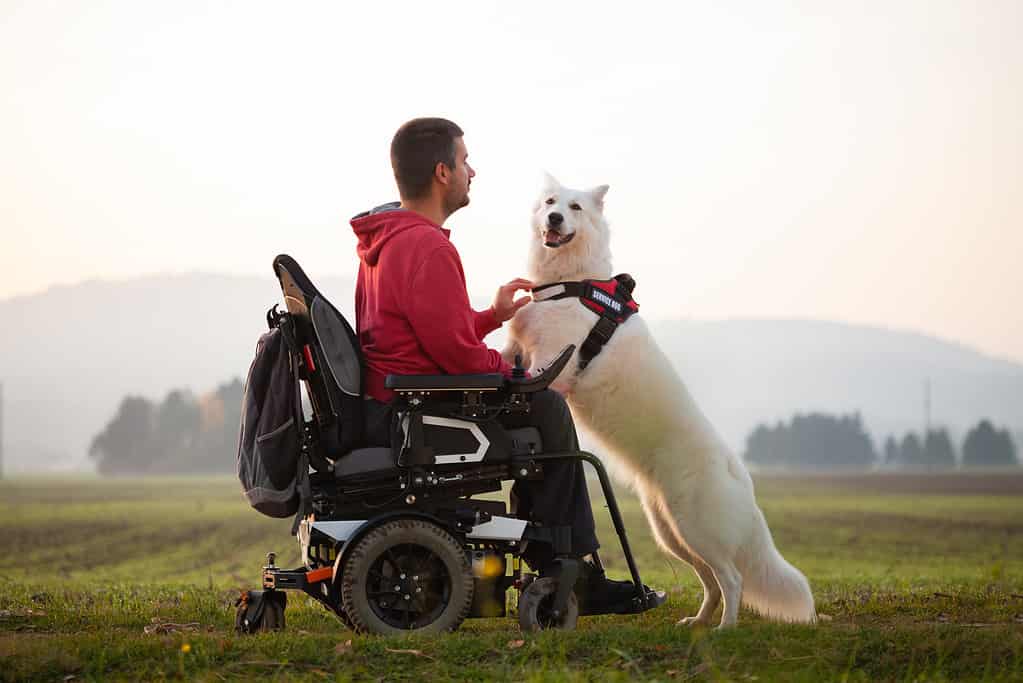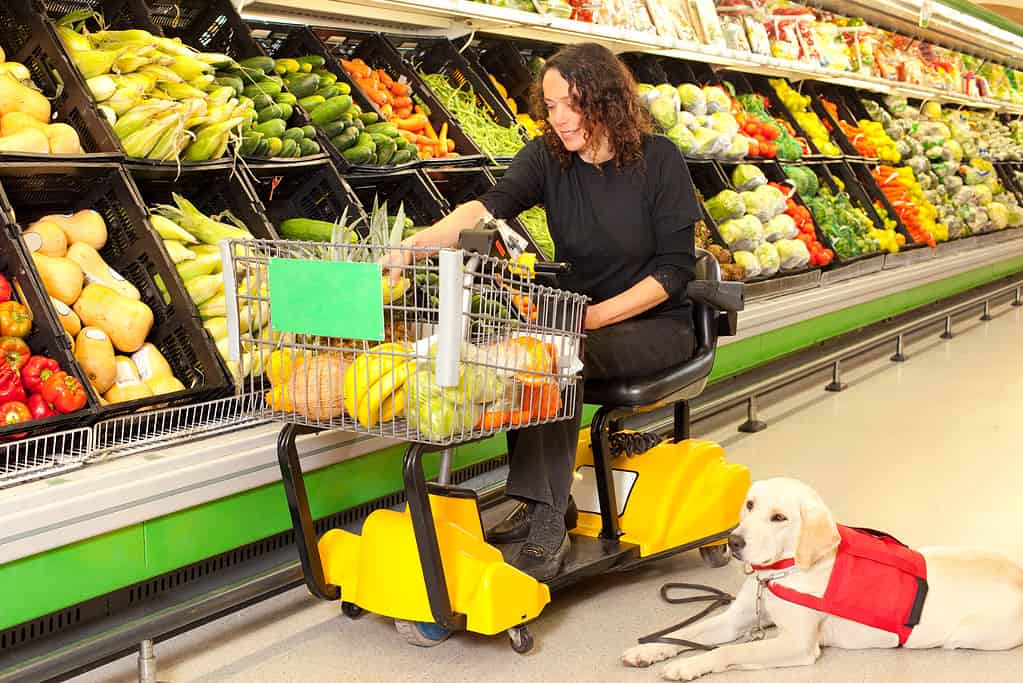As pet owners, we love our canine friends and treat them like family. Keeping them by our side everywhere we go appeals to many people. One question begs answering: are dogs allowed in grocery stores? Let’s explore the answer below!
By and large, dogs are not allowed in grocery stores, particularly because of the potential for contamination of food items. In the United States, the Food and Drug Administration (FDA) specifically restricts live animals from entering grocery stores, restaurants, or other food establishments. This ruling applies to dogs, cats, birds, and other animals. The only exception is for service dogs.
Why Are Dogs Not Allowed in Grocery Stores like Walmart?

For the most part, dogs are not allowed in grocery stores.
©ALFSnaiper/iStock via Getty Images
Like other stores that sell food for human consumption, Walmart does not allow dogs in their grocery store. That’s because they present a risk of contaminating the food people will purchase and eat. Dogs carry several zoonotic diseases that make humans very sick. Zoonotic diseases are those humans get from animals and vice versa. Some zoonotic diseases include coccidia, giardia, and leptospirosis.
Are There Any Exceptions That Allow Dogs in Grocery Stores?

Service dogs are allowed in grocery stores and anywhere that allows public access.
©24K-Production/iStock via Getty Images
Yes! Human handlers requiring the assistance of a service dog are allowed to bring their dogs into grocery stores. A service dog, as defined by the Americans With Disabilities Act (ADA), is “any dog that is individually trained to do work or perform tasks for the benefit of an individual with a disability, including a physical, sensory, psychiatric, intellectual, or other mental disability.”
This definition does not include emotional support animals (ESA). According to the ADA, an ESA is a pet that can “provide companionship, relieve loneliness, and sometimes help with depression, anxiety, and certain phobias, but [does] not have special training to perform tasks that assist people with disabilities.”
While an ESA may be any type of pet, service animals are restricted to dogs. However, the ADA does state reasonable accommodations must be made for trained miniature horses that assist the disabled. However, for places like airplanes where space and weight are limiting factors, miniature horses may not be permitted.
5 Important Rules For Service Dogs in Grocery Stores

While grocery stores permit service dogs, they do not allow pet dogs.
©tifonimages/iStock via Getty Images
Now that we know that only service dogs are allowed in grocery stores, let’s cover some important rules to follow regarding these incredible animals! These rules are specifically laid out by the ADA to provide the best possible conditions for the service dog, the handler, and others visiting the same places.
#1 Must Be Under the Control of the Handler
This rule means that the dog must be harnessed, leashed, or otherwise tethered to the handler when accompanying them in grocery stores. In some cases, the handler cannot hold onto a leash, or a leash would interfere with their ability to work. When this is true, the dog may be under voice control. If the dog is out of the handler’s control, the team may be asked to leave.
#2 Must Be Housebroken
The service dog must be trained not to potty in the grocery store (or other public areas). Obviously, this is essential for the health and safety of all humans visiting the same areas as the dog. Many places, such as airports and cruise ships, actually provide specific areas for service dogs to relieve themselves.
#3 Up to Date on Vaccinations as Required By Law
Because dogs can transmit disease to both other dogs and humans, they must be fully vaccinated to ensure their safety and that of others. The ADA specifies that the dog must be vaccinated following state and local laws. All dogs, including service dogs, must be vaccinated against rabies according to federal law. Many veterinarians around the country provide free examinations for service dogs. Also, many assistance programs are available to help with the cost of care. This is especially important for dogs in grocery stores, where disease can be passed through contaminated foods.
#4 Clean Up and Supervision
The ADA expressly removes the responsibility of supervising or cleaning up after service dogs from businesses they visit. This means the handler is solely responsible for keeping their dog under control and cleaning up any messes they make. This includes things like the dog knocking over displays in grocery stores but does not require the handler to sweep up shed hair. That’s because hair shedding is not something that can be prevented through training.
#5 Behavior
Service dogs must not disrupt the normal activities in the grocery store. Basically, the dog must behave and allow other patrons to complete their shopping without interacting with or otherwise disturbing them. This is a rather broad rule, but examples of disrupting the business include:
- Excessive barking — if the service dog is barking over and over in a movie theater, the business may ask the handler to remove the dog from the theater. However, the business should ensure the barking is not a medical alert for the handler before removal is warranted. This situation falls into the under-control rule, as well.
- Growling — if the dog is growling or otherwise behaving viciously (lunging, trying to bite, etc.) and poses a direct threat to other patrons, businesses can ask that the dog be removed.
- Elimination — if the service dog urinates or defecates inside a business, the business can ask them to leave. The handler is also required to clean up the mess.
While this rule is fairly broad and open to interpretation, disturbances that allow removal do not include shedding or other persons’ allergies to dogs.
Final Thoughts on Dogs in Grocery Stores
Although service dogs are allowed to enter any place that allows public access, the same is not true for pet dogs. This includes bringing dogs into grocery stores. When service dogs enter public areas, rules exist that they must follow for health and safety.
The photo featured at the top of this post is © Ljupco/iStock via Getty Images
Ready to discover the top 10 cutest dog breeds in the entire world?
How about the fastest dogs, the largest dogs and those that are -- quite frankly -- just the kindest dogs on the planet? Each day, AZ Animals sends out lists just like this to our thousands of email subscribers. And the best part? It's FREE. Join today by entering your email below.
Thank you for reading! Have some feedback for us? Contact the AZ Animals editorial team.







